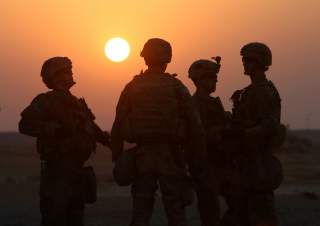America Does Not Need a Draft
A hundred courageous volunteers are worth more than a thousand reluctant warriors.
“The American society's failure to share the burden of a common defense has forced its professional military and their families to pay a volunteer tax that is unsustainable.” “For the security of the United States, it is time Americans consider instructing their young people that the great benefits of citizenship come with some daunting responsibilities.”
The fact that only a few of America's citizens are bearing an outsized burden defending our nation is often cited as a reason why one might consider bringing back a draft. The theory is that a draft would spread the commitment to serve over all strata of society equally: rich, poor, white, non-white, city, rural, etc. Additionally, the draft would somehow involve more young men and women in the military burden than the current system.
But the reason that only a relative few are in the military is not because we have a volunteer system. The reason is that we the people—Congress—have decided that our military should be of a certain size (1.3 million). Congress decides how many troops we can afford to field. Congress decides how many lieutenants, captains, generals, admirals etc. we have—down to the individual person. We have enough volunteers for today's military, but whether we drafted those people into service or accepted them as volunteers, we would still only need 1.3 million service members because that is all that Congress authorizes.
If one thinks we should have more troops in our military, that's a different debate than whether we should get those people through a draft or a volunteer system. But keep in mind that during the 1970s and 1980s when our military was over two million, we did not need a draft to staff that force.
And where do these volunteers come from? From the poor and uneducated of our country? Not at all. According to the FY 2016 report by the Office of the Under Secretary of Defense for Personnel and Readiness, all the recruits accessed into the military scored “considerably higher on the AFQT [an aptitude and education test] than did the 18-to 23-year-old civilian population.” The same report showed that the majority of recruits come from middle economic class families: “The findings … are important because they dispel the myth that the military obtains the majority of its recruits from the lower socioeconomic classes—those neighborhoods with the lowest income levels. Quite the opposite is true.” Enlisted military members come from all of the fifty states, but some regions contribute more than others. In absolute terms, the top five states for recruitment in 2016 were California, Texas, Florida, Georgia and New York. These statistics demonstrate that the recruits are representative of our nation, while being some of our best young men and women.
“If America fails to return to a conscription model, cultural deterioration will continue, an insufficient number of citizens will answer the call of military duty, and America will not be able to go to war.”
Although some military components have difficulty from time to time meeting recruiting goals, over the forty plus years of the AVF the nation’s youth have reliably answered the call to serve—whether it was 2.3 million or 1.3 million. Young men and women like Nick De Gregorio have stepped forward to serve their nation in the military. During those forty plus years, America has gone to war numerous times, in both short and extended conflicts. In all those conflicts the vast majority of American military units performed admirably. There is no evidence that there are insufficient volunteers or that America cannot prosecute its wars.
The All Volunteer Force is consistent with American values, in which the government should exercise restraint in circumscribing individual liberty. When there is a good reason to do so, without viable alternatives, such intervention into the lives of citizens is permissible. But if there are alternatives to infringing on personal liberty, both American society and its citizens benefit by allowing individuals to pursue their chosen talents.
Service to one's nation can take many forms: emergency responders, police, teachers, military and others. It should be continuously encouraged among our citizens. But if we mandate service, is it really service? I would rather have a hundred courageous volunteers like Nick De Gregorio than a thousand reluctant warriors.
Brig. Gen. (retired) Kevin Ryan is an Associate Fellow at Harvard Kennedy School’s Belfer Center. His last assignment in the Army was in G35 at the Pentagon managing Army Strategy, Plans, and Policy.

